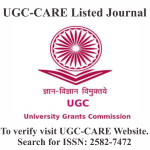EXPLORING INTERRELATIONSHIPS AMONG FACTORS INFLUENCING CONSUMER TRUST IN AI-DRIVEN VEHICLES: A CORRELATION ANALYSIS
DOI:
https://doi.org/10.29121/shodhkosh.v5.i6.2024.5548Keywords:
Ai-Driven Vehicles, Consumer Trust, Perceived Safety, Ai Decision-Making, Road Safety, Autonomous Technology, Artificial Intelligence, Human-Ai Interaction, Vehicle Automation, Trust in AiAbstract [English]
The rapid advancement of artificial intelligence (AI) in the automotive industry has introduced AI-driven vehicles that promise enhanced safety, efficiency, and decision-making capabilities. However, consumer trust remains a critical factor influencing the adoption and acceptance of these technologies. This study investigates the relationship between perceived safety, AI decision-making capabilities, and consumer trust in AI-driven vehicles. A quantitative research approach was employed, with data collected from 389 respondents using a structured questionnaire based on a five-point Likert scale. Correlation analysis was conducted to assess the strength and significance of relationships between key variables, with hypotheses tested at a 95% confidence level. The findings reveal a strong positive correlation between perceived AI safety features and consumer trust, highlighting the importance of AI's ability to interpret traffic rules, adapt to unpredictable scenarios, and enhance road safety. The study provides practical implications for automobile manufacturers, policymakers, and AI developers by emphasizing the need for transparent AI decision-making, enhanced safety measures, and user education to foster greater consumer trust. While offering significant insights, the study acknowledges limitations such as sample bias, reliance on self-reported data, and the evolving nature of AI technology. Future research should explore trust dynamics across diverse cultural and regulatory landscapes and incorporate longitudinal studies to track shifts in consumer attitudes over time.
References
Bansal, P., Kockelman, K. M., & Singh, A. (2016). Assessing public opinions of and interest in new vehicle technologies: An Austin perspective. Transportation Research Part C: Emerging Technologies, 67, 1-14. https://doi.org/10.1016/j.trc.2016.01.019 DOI: https://doi.org/10.1016/j.trc.2016.01.019
Bonnefon, J.-F., Shariff, A., & Rahwan, I. (2016). The social dilemma of autonomous vehicles. Science, 352(6293), 1573-1576. https://doi.org/10.1126/science.aaf2654 DOI: https://doi.org/10.1126/science.aaf2654
Choi, J. K., & Ji, Y. G. (2015). Investigating the importance of trust on adopting an autonomous vehicle. International Journal of Human-Computer Interaction, 31(10), 692-702. https://doi.org/10.1080/10447318.2015.1070549 DOI: https://doi.org/10.1080/10447318.2015.1070549
Lin, P. (2016). Why ethics matters for autonomous cars. In M. Maurer, J. C. Gerdes, B. Lenz, & H. Winner (Eds.), Autonomes Fahren (pp. 69-85). Springer Vieweg. https://doi.org/10.1007/978-3-662-48847-8_4 DOI: https://doi.org/10.1007/978-3-662-45854-9_4
Petit, J., & Shladover, S. E. (2015). Potential cyberattacks on automated vehicles. IEEE Transactions on Intelligent Transportation Systems, 16(2), 546-556. https://doi.org/10.1109/TITS.2014.2342271 DOI: https://doi.org/10.1109/TITS.2014.2342271
Yuen, K. F., Wang, X., Ma, F., & Li, K. X. (2020). Trust, risk perception, and intention to use autonomous vehicles: An interdisciplinary bibliometric review. AI & Society. https://doi.org/10.1007/s00146-024-01895-2 DOI: https://doi.org/10.1007/s00146-024-01895-2
Zhang, B., & Chen, J. (2024). Data security in autonomous driving: Multifaceted challenges of technology, law, and social ethics. World Electric Vehicle Journal, 16(1), Article 6. https://doi.org/10.3390/wevj16010006 DOI: https://doi.org/10.3390/wevj16010006
Waymo. (2024, September 5). Waymo thinks it can overcome robotaxi skepticism with lots of safety data. https://www.theverge.com/2024/9/5/24235078/waymo-safety-hub-miles-crashes-robotaxi-transparency
New York Post. (2024, October 10). Elon Musk's Tesla rolls out robotaxis in gamble on 'black box' AI tech amid safety concerns. New York Post. https://nypost.com/2024/10/10/business/elon-musks-tesla-gambles-on-black-box-ai-tech-for-robotaxis/
News.com.au. (2024, October 10). 'Dark hole': Big issue in rise of smart cars. https://www.news.com.au/technology/gadgets/dark-security-hole-foreign-smart-cars-more-likely-to-listen-in-than-be-controlled-remotely-experts-say/news-story/f4b82e7cf62268c1b59f652787a7cc5b
Reuters. (2025, February 13). Cybertruck crash raises alarm bells about Tesla's self-driving software. Reuters. https://www.reuters.com/business/autos-transportation/cybertruck-crash-raises-alarm-bells-about-teslas-self-driving-software-2025-02-13/
Financial Times. (2025, February 15). Can self-driving cars save us from ourselves? https://www.ft.com/content/f2eaa452-4772-4929-9317-69bc7b53ff2c
Financial Times. (2025, February 15). The Big Question: would you trust a driverless car? https://www.ft.com/content/23fc8b15-8f80-43ee-a4f2-a5a68998e43c
Leipzig, D. S. (2025, March 4). We are at an inflection point with AI. Which way will we go? San Francisco Chronicle. https://www.sfchronicle.com/opinion/openforum/article/artificial-intelligence-data-trust-20185570.php
Downloads
Published
How to Cite
Issue
Section
License
Copyright (c) 2024 Rahul Mohan Mali, Dr. Santosh Shinde, Dr. Shrikant Waghulkar

This work is licensed under a Creative Commons Attribution 4.0 International License.
With the licence CC-BY, authors retain the copyright, allowing anyone to download, reuse, re-print, modify, distribute, and/or copy their contribution. The work must be properly attributed to its author.
It is not necessary to ask for further permission from the author or journal board.
This journal provides immediate open access to its content on the principle that making research freely available to the public supports a greater global exchange of knowledge.




















